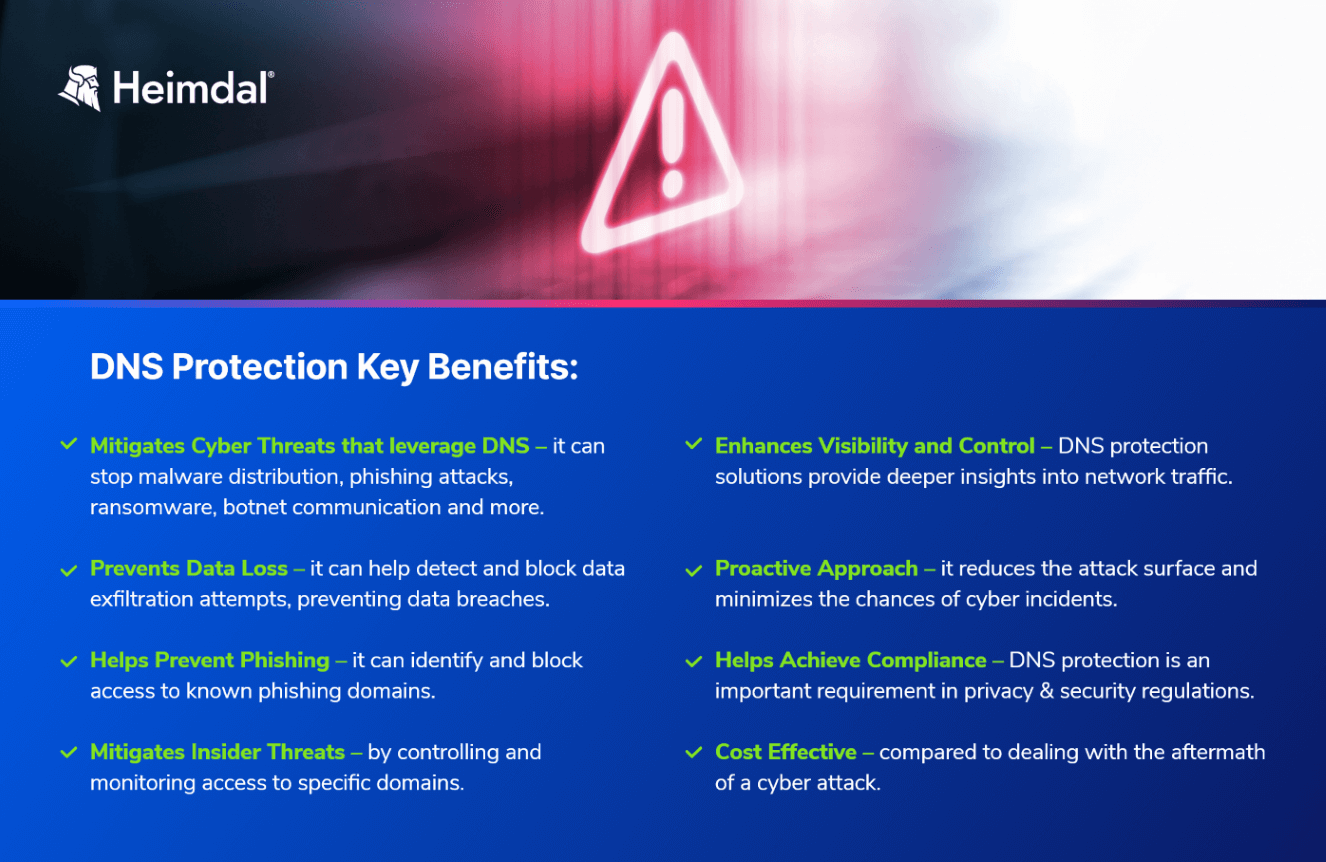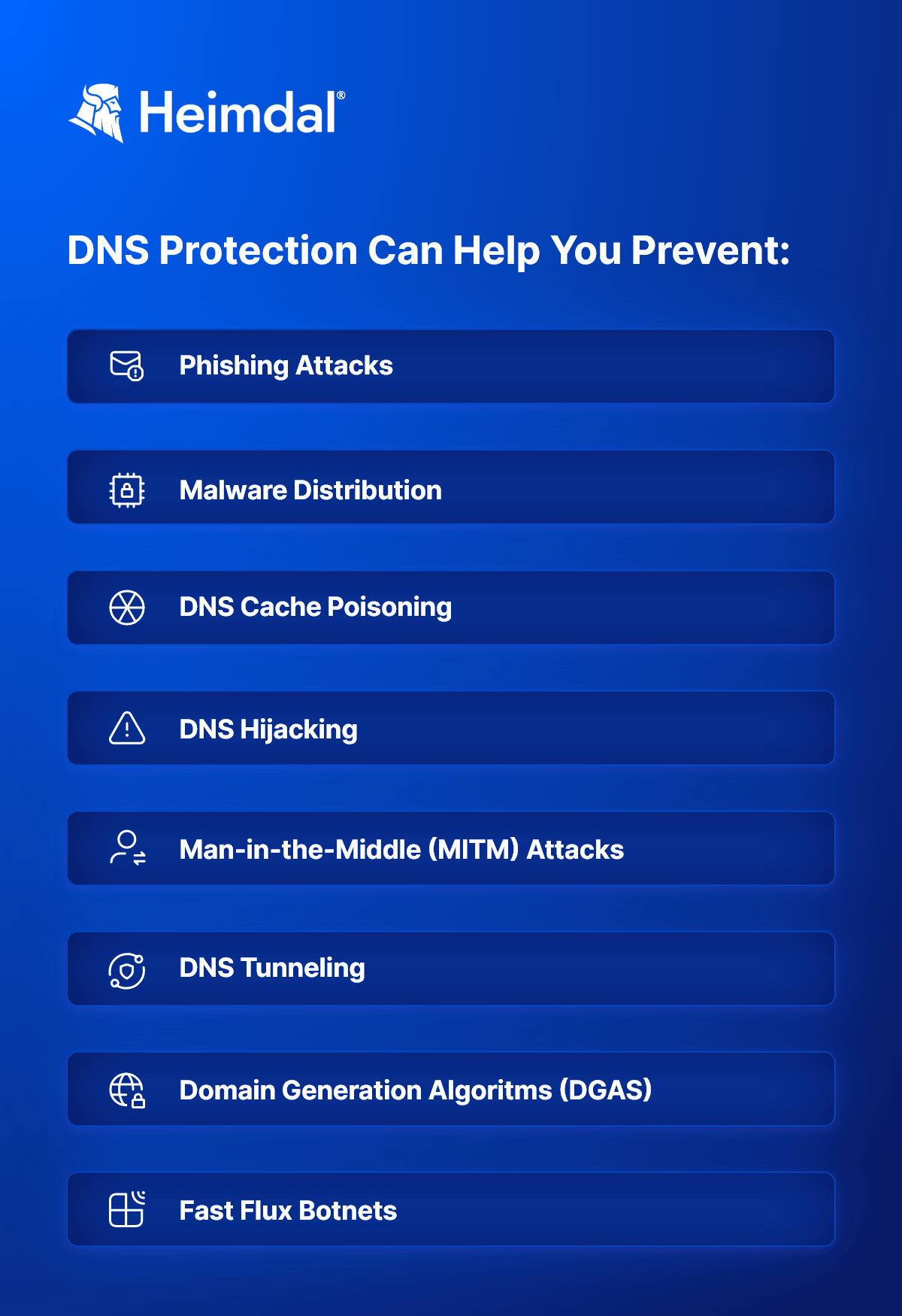Contents:
Picture this scenario: you’re browsing the internet, going about your business, when suddenly a malicious website pops up out of nowhere. Your heart races as you realize that your sensitive data and personal information may be at risk. You scramble to find a solution to protect yourself and your company from these cyber threats.
Enter DNS Protection – the shield that stands between you and those lurking online dangers. In this article, we’ll explore what DNS protection is, who needs it, why it is crucial, how it works, what types of attacks it prevents, and how to get started with this approach. Furthermore, we will delve into how Heimdal can assist you in bolstering your organization’s DNS security.
So let’s dive right in!
What Is DNS Protection?
DNS protection is a cybersecurity approach designed to safeguard the Domain Name System (DNS) from various threats and attacks, preventing unauthorized access, data breaches, and other malicious activities. It acts as the first line of defense against cyber threats, ensuring the reliability, availability, and integrity of Internet communication.
Think of it as a security guard stationed at the entrance of your digital universe – constantly monitoring incoming domains and ensuring only safe connections are allowed while blocking anything suspicious or dangerous in real-time.
Who Needs DNS Protection?
In short, every company that utilizes the internet needs DNS protection. Cybercriminals often exploit DNS vulnerabilities to conduct phishing attacks, distribute malware, initiate DDoS attacks, and launch other cyber attacks. Small, medium, and large enterprises alike are equally at risk, and even a single successful attack can have devastating consequences.
Moreover, businesses that prioritize their brand image need DNS protection to prevent malicious actors from defacing their websites or redirecting visitors to malicious sites. Such incidents can tarnish a company’s reputation overnight.
But how exactly does DNS protection help businesses? Let’s explore its key benefits next!
Why Is DNS Protection Important? Key Benefits
DNS protection has a wide range of key benefits that help an organization defend its digital assets and fortify its cybersecurity posture. Here are the main advantages DNS protection can provide:
- Mitigates Cyber Threats that leverage DNS: DNS protection helps prevent a myriad of cyber threats, including malware distribution, phishing attacks, ransomware, and botnet communication. By filtering and blocking access to malicious domains, it ensures that users within the organization are not exposed to harmful content or deceived by deceptive websites.
- Prevents Data Loss: Cybercriminals may attempt to exfiltrate sensitive data by leveraging DNS. A DNS solution helps detect and block these data exfiltration attempts, preventing potential data breaches and protecting valuable information from falling into the wrong hands.
- Helps Prevent Phishing: Phishing attacks heavily rely on deceptive domains to trick users into divulging sensitive information. A DNS solution can identify and block access to known phishing sites, reducing the risk of employees falling victim to these malicious schemes.
- Insider Threat Mitigation: Not all cybersecurity threats come from external sources. DNS protection can help control and monitor access to specific websites, limiting the potential for insider threats or unauthorized activities by employees.
- Enhanced Visibility and Control: DNS protection solutions provide organizations with deeper insights into their network traffic. It allows administrators to exercise granular control over what websites users can access.
- Proactive Security Posture: By blocking access to known malicious domains and suspicious websites, DNS protection proactively strengthens an organization’s security posture. It reduces the attack surface and minimizes the chances of successful cyber incidents.
- Helps Achieve Compliance: Many industries have specific data security and privacy regulations that organizations must adhere to. DNS protection is an important criteria in meeting these compliance requirements, demonstrating a commitment to data protection and privacy.
- Cost-Effectiveness: Implementing DNS protection is a cost-effective measure compared to dealing with the aftermath of a successful cyber attack. The financial losses and reputational damage resulting from data breaches or cyber incidents far outweigh the investment in a DNS solution.

Furthermore, an IDC study from 2022 shows that an estimated 98% of businesses were victims of a DNS attack, with each incident costing an average of $942,000 and causing an estimated 70% of applications to go down.
How Does DNS Protection Work?
DNS protection usually requires implementing various security measures such as:
- DNS Filtering: DNS filtering involves analyzing DNS queries and responses to identify known malicious domains, IP addresses, and URLs. Access to these malicious destinations is blocked, preventing users from accessing harmful content.
- DNSSEC (DNS Security Extensions): DNSSEC adds an additional layer of security to DNS by digitally signing DNS data. It ensures the authenticity and integrity of DNS records, reducing the risk of DNS cache poisoning attacks.
- Anomaly Detection: DNS protection solutions monitor DNS traffic for unusual patterns or behavior that may indicate malicious activities. Any abnormal activities are detected and promptly addressed to prevent potential threats.
- Reporting and Analytics: DNS protection tools provide detailed reports and analytics on DNS traffic, enabling organizations to gain insights into potential security risks and take proactive measures.
Read more about the best DNS practices here: DNS Best Practices: A Quick Guide for Organizations.
What Kind of Attacks Can Be Prevented via DNS Filtering?
A DNS filter can effectively prevent or mitigate several of the cyber attacks that leverage DNS. Here are some examples:
Phishing Attacks
A DNS filter can block access to known malicious domains used in phishing campaigns. It can identify and categorize suspicious domains, preventing users from accessing deceptive websites that attempt to steal sensitive information.
Malware Distribution
DNS filtering can detect and block communication between malware-infected devices and their command-and-control (C&C) servers. By disrupting this communication, it limits the spread of malware and prevents it from receiving further instructions or downloading additional payloads.
DNS Cache Poisoning
DNS filtering can detect and prevent DNS cache poisoning attacks. By filtering out malicious DNS responses, it ensures that users are directed to the correct and legitimate websites.
DNS Hijacking
DNS filtering can identify unauthorized changes to DNS settings and prevent traffic redirection to malicious websites. It helps protect users from unknowingly accessing dangerous domains.
Man-in-the-Middle (MITM) Attacks
DNS filtering can help prevent MITM attacks by blocking access to websites with fraudulent SSL certificates or domains known to be involved in such attacks.
DNS Tunneling
DNS filtering can detect and block DNS tunneling attempts, preventing attackers from using DNS channels to exfiltrate data or communicate covertly.
Domain Generation Algorithms (DGA)
DNS filtering can detect and block traffic to domains generated by DGAs. This prevents malware from establishing connections with the malicious domains.
Fast Flux Botnets
DNS filtering can identify and block fast flux botnet activity by monitoring the rapid changes in IP addresses associated with malicious domains.

How to get started with DNS Protection?
DNS protection doesn’t have to be complicated or time-consuming. Here are some simple steps to help you get started:
1. First, assess your current DNS infrastructure and identify any vulnerabilities that may exist. This can be done by conducting a thorough audit of your DNS settings and configurations. Look for areas where security measures may be lacking or outdated.
2. Next, choose a reputable DNS protection provider that meets your specific needs. Consider factors such as the level of security offered, ease of implementation, and compatibility with your existing systems. Take the time to research different providers and read reviews from other companies who have used their services.
3. Once you’ve selected a provider, it’s time to implement their DNS protection solution. This typically involves updating your domain name server (DNS) records to point to the provider’s servers instead of using default ones provided by your internet service provider (ISP). Your chosen provider should provide clear instructions on how to make these changes.
4. After implementing the new DNS protection solution, regularly monitor its performance and effectiveness. Keep an eye out for any unusual activity or signs of potential attacks being blocked successfully.
Don’t forget about ongoing maintenance and updates. Security threats evolve over time, so it’s important to stay up-to-date with the latest protections offered by your chosen provider.
How Can Heimdal® Help Protect Your DNS Infrastructure?
Since 2014, we’ve been helping customers all over the world secure their domain name system, and we’ve become an industry leader in the process. One of our core products, Threat Prevention, includes a unique feature called Predictive DNS, which uses artificial intelligence and machine learning to scan user traffic in real time, proactively block infected domains, and accurately predict threats with a 97% accuracy rate.
Available for both endpoint and network levels, our solution seamlessly integrates with any other security product on the market and can be deployed in your environment in less than an hour.
Its cloud-native Threat Intelligence protects your most valuable assets from threats ranging from human error to full-fledged malware campaigns. In the past year alone, Heimdal® successfully blocked 170 million DNS, HTTP, and HTTPS attacks, showcasing its effectiveness in safeguarding DNS infrastructure.
Book a demo and take your DNS security to the next level!

Heimdal® DNS Security Solution
- Machine learning powered scans for all incoming online traffic;
- Stops data breaches before sensitive info can be exposed to the outside;
- Advanced DNS, HTTP and HTTPS filtering for all your endpoints;
- Protection against data leakage, APTs, ransomware and exploits;
Wrap Up
DNS protection is not a luxury, it is a necessity. Companies of all sizes must be proactive in securing their DNS infrastructure to defend against cyber threats that can have severe consequences.
By implementing DNS protection, organizations can significantly enhance their security posture, prevent data breaches, and ensure smooth, uninterrupted network operations.
For additional information on DNS Security, make sure you check out my colleague Alina’s eBook below.

DNS Security for Dummies
An eBook that gives a comprehensive role-based security approach and addresses the numerous dangers to the Domain Name Systems (DNS) as cyberattacks increase globally.
If you liked this article, follow us on LinkedIn, Twitter, Facebook, and Youtube, for more cybersecurity news and topics.










 Network Security
Network Security
 Vulnerability Management
Vulnerability Management
 Privileged Access Management
Privileged Access Management  Endpoint Security
Endpoint Security
 Threat Hunting
Threat Hunting
 Unified Endpoint Management
Unified Endpoint Management
 Email & Collaboration Security
Email & Collaboration Security








